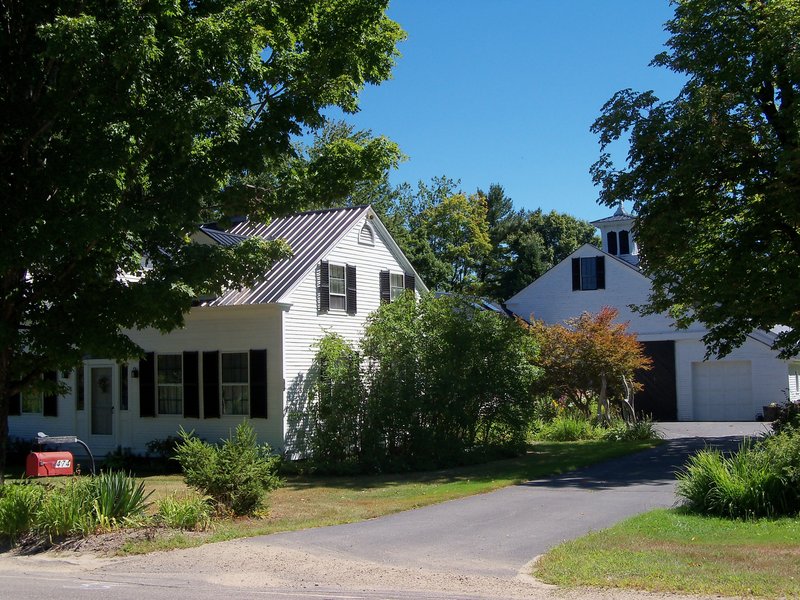Caroline Jordan presented a talk last week about courtship and marriage in the Bridgton of 150 years ago.
The subject revolved around the life of Phoebe Beech (1834-1899), a complex woman coming of age in South Bridgton. Jordan drew from Beech’s diary, a treasure trove of information. “It was in a cigar box that said: pens and pencils, manuscript of Phoebe F. Beech Esq. It could have been so easily lost.”
A writer with a connection to the Bridgton Historical Society that began in her teens, Jordan hopes to compile a fictionalized version of Beech’s life.
“I started researching South Bridgton history in high school, and I don’t really know why,” Jordan said. “There was a great Bridgton history book and I started reading about South Bridgton for a term paper in English class.”
Though events in her adult life removed her from South Bridgton, Jordan recently returned to nearby Waterford and is a trustee with the historical society.
A YOUNG BEAUTY
It seems the local boys of 1850s South Bridgton were just tripping over one Phoebe Beech. But Beech was independent-minded, well-educated and by no means ready for the first young gentleman who prospected her, as is told in an entry dated July 1, 1857: “This morning the delectable Mr. Jacob Choate called and invited me to go up on Pleasant Mountain with his honored self, 4th of July. I told him I ‘was engaged & could not.’ which was, I am sorry to say, a lie. But it caused him to go off just as nicely as if it had have been the truth and that was all I cared for (I wonder what I shall think of this performance when I am old – this afternoon I went out to work in my flower garden. I was just thinking what Jake would say if the truth ever came out and he should find that my engagement was to remain quietly at home all day on the Fourth.”
Beech was 23 at the time; pressures for her to marry where everywhere. Jordan said young adults of the area typically courted between 18 and 25, with marriage occurring in one’s mid-20s. However, Jordan says Beech did not find the domestic roles particularly appealing.
“She talked so much about courtship and not wanting to get married,” said Jordan. “She writes she did not want to be a ‘baby manufacturer and stocking darner.’ She was outright mean to some of her male prospects.”
DATING 150 YEARS AGO
Beech writes of her eventual courtship, thought to be typical of the times, as prim and proper, describing sitting in the parlor with the prospect’s family. “There was the usual, ‘I like this one this week and I like that one next week’ kind of writings,” Jordan said.
Young women also met potential husbands at church social gatherings or at “singings.” Young men attended these singings simply to be lucky enough to walk a young lady home. “They didn’t care about the singing,” Jordan says.
Singings also occurred at private homes. Ice skating on Adams Pond, across the street from where Beech grew up on Route 107, was another chance to meet potential husbands. “There was a lot of group dating,” Jordan said, “before a couple got to the point where a prospect walked someone home and they kissed at the door.”
Beech’s father was a sailor and a drinker. She found herself in South Bridgton because her parents were deemed unfit to care for her; her aunt and uncle, the Fessendens, raised her.
“Phoebe was kind of a cross between Scarlett O’Hara and Jane Austen,” Jordan says. “Her writings have so much life to them.”
At one point Beech writes that once folks get married they become “very matter-of-fact and commonplace; they stop loving each other.” “I wonder how much of that was her observing her aunt and uncle,” Jordan said.
HAPPILY EVER AFTER?
Due to familial and societal pressures, Beech ultimately married. A woman of the day who stayed single became thought of unflatteringly as an “old maid,” or the “poor relation.” “Had she not married, her expected role as wife and mother would not have been fulfilled,” said Jordan.
Beech’s role as a wife was short-lived, however, thanks to the Civil War. Early on Jordan said Beech is somewhat content with marriage, but pregnancy does not amuse her. In a six-month span, events turn tumultuous. Shortly before her pregnancy, her uncle dies. Following that, her newborn baby lives only six weeks.
“She doesn’t cry about it,” Jordan said. “But her husband is so distraught at the infant’s death that he marches off to the Civil War.” He’s wounded in battle, dies of his injury and leaves Phoebe widowed. This news is the last entry in her diary.
“She may have gone to Washington to care for soldiers as a nurse,” Jordan said. “Much of the rest of her life is a mystery.”
At 65, she’s laid to rest in Fryeburg.
The Bridgton Historical Society received a grant allowing the presentation of a multipart, yearlong program called “Cradle to Grave” where significant periods of 19th-century life will be displayed and discussed. More programs will be offered at 7 p.m. the third Tuesday of every month at 5 Gibbs Ave. in Bridgton. September’s program is on midwives; October’s program is on funerals.
Don Perkins is a freelance writer who lives in Raymond. He can be reached at: presswriter@gmail.com
Send questions/comments to the editors.



